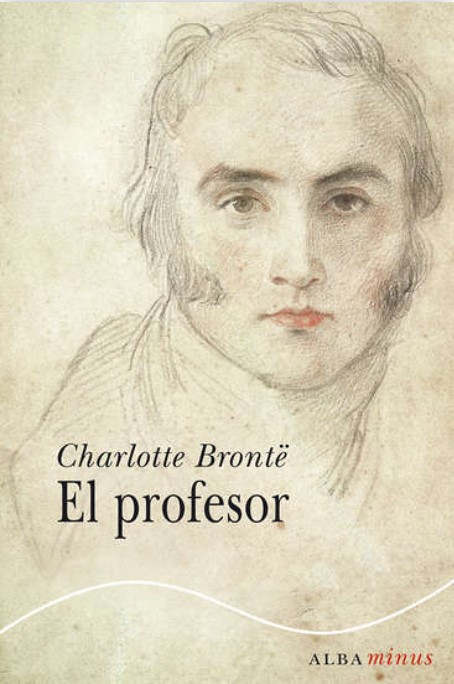- Books
- 30 de April de 2024
- No Comment
- 8 minutes read
Love and Tenacity: The Professor (1857) by Charlotte Brontë

Love and Tenacity: The Professor (1857) by Charlotte Brontë
This story, the first one written by Charlotte Brontë, remained unpublished and did not see the light until 1857, a year after the author’s death


This surprising and clean book, published by Alba Editorial and translated by Gema Moral, catches my eye in the bookstore. I buy it on an irrational impulse and devour it in a few afternoons. I find it fascinating. It is my first experience with one of the Brontë sisters. It could not be otherwise, since I am part of the half of the humanity of readers who adore Jane Austen. From the first paragraphs, I notice the firm pulse of Balzac but more orderly, much more austere, so that the strength of this text comes rather from subtlety than from the celebration of life and its contradictions. And, in fact, it is a text not at all accomodating, focused on the trajectory of a Nietzschean spirit, but twenty years before Nietzsche.
I confess that I bought the book with the idea that it might include notes on the education of the time, or on the pedagogical ideology of the author. I was disappointed soon as there is very little of this. The story of William Crimsworth, the Anglican professor who travels to Brussels fleeing the vulgarity of the bourgeois around him, has much more to do with love and an exacerbated sensitivity than with pedagogy. Moreover, I would add that our hero would be today a “profesaurian”.
This story, the first one written by Charlotte Brontë, remained unpublished and did not see the light until 1857, a year after the author’s death. I have the theory that the unaccomodating content of this novel could have been behind that fact. The Aristotelian rigour with which she wrote contrasts with the restrained passions she reflects, and has much to do with the “homely ideal” she speaks of in the prologue. What is truly astonishing is the diamond-like quality of this prose. I would say that to achieve something like this in Spain we had to wait until 1880, the time of Clarín, Emilia Pardo Bazán and the mature Galdós. How can such a well-woven text be an opera prima!
The protagonist is permanently in a bad mood, and only small miracles of spiritual excellence can bring him comfort among a masquerade of characters as low as they are mediocre. Crimsworth is not supposed to be friendly. He is a bitter man, and yet we would have liked to be his friends, because the smiling and the integrated make us sick. That is specifically what the novel is about: the search for authenticity in an industrialised and hypocritical context. Therefore, the pedagogical ideas reflected by the author surprise us by an acrimony that borders on pure and simple intolerance: everything that does not seem English education is related to the life of “the pigs”. And those pigs are the French, the Flemish and the Spaniards. Let us observe the pearls that Charlotte Brontë, through Crimsworth’s story, dedicates to Catholic students and Belgian citizens, whom she treats as if they were specimens of an inferior species: “An air of bold, impudent flirtation, or a loose, silly leer, was sure to answer the most ordinary glance from a masculine eye. I know nothing of the arcana of the Roman Catholic religion, and I am not a bigot in matters of theology, but I suspect the root of this precocious impurity, so obvious, so general in Popish countries, is to be found in the discipline, if not the doctrines of the Church of Rome” (p. 89) 1. The Belgian girls are depraved and disobedient, cunning and cruel. They do not wash properly, and yet they come out better than the two pedagogues who play an important part in the plot: madame Reuter, considered to be an unbearable flirt, and monsieur Pelet, a sensual drunkard who the author uses to launch all kinds of offences against the French nation. It is curious the level of moralistic misogyny that these pages written by a young English Schopenhauer concentrate.
Of a student in his English class, Crimsworth/Brontë write: “She (Adele Dronsart) was an unnatural-looking being — so young, fresh, blooming, yet so Gorgon-like” (p. 90). Of Aurelia Koslow, half-breed between German and Russian, he says that “she is ignorant and ill-informed: incapable of writing or speaking correctly even German, her native tongue, a dunce in French, and her attempts at learning English a mere farce, yet she has been at school twelve years” (p. 89). Crimsworth is becoming more and more desperate and hateful of the boring European bourgeoisies, full of fatuity and ignorance. These students are often insubordinate, they whisper, they make many mistakes and try to boycott classes at the slightest opportunity. They are demonic little angels. After all, it is amusing to read all this, because not much progress has been made on these problems.
The whole Catholic world is stinky and wild, to the point that the narration comes to speak of “Romish wizard-craft” (p. 92). Only one Anglo-Swiss girl is saved from the fire, and it is obviously Frances Evans the heroine of modesty and submission who then concentrates all the light that William Crimsworth manages to project among his thousand economic tribulations. The message comes clear: the young heroes manage to make their way in an urban world, that is a carnival of fools and lascivious, through reading and the purification of intelligence.
However, do not be fooled by these surprising notes: the novel is splendid, a prodigy of truth and precision, far beyond the social conflicts it reflects. I find it perplexing that such an evidently romantic text, written by an English narrator, so closely resembles a Russian narrative and even some of Pío Baroja’s. The young lovers meet again in a cemetery, and the author loves storms and self-tortured walks. But it all fits together so well, nothing comes out of the subtle suggestion. Swap Brussels for Madrid and this is very much like Las noches del Buen Retiro. The titanic struggle of a penniless little professor in a country that seems barbaric to him provides a living model of what culture and self-discipline mean as paths to human improvement.
___
1 Page numbers according to the edition created and published by Global Grey, 2018
English : https://www.iberlibro.com/9781548294144/Professor-1857-Charlotte-Bronte-First-1548294144/plp
Source: educational EVIDENCE
Rights: Creative Commons

